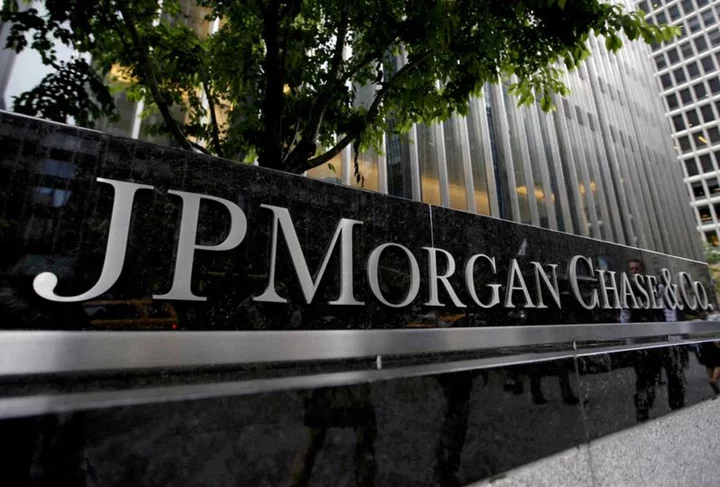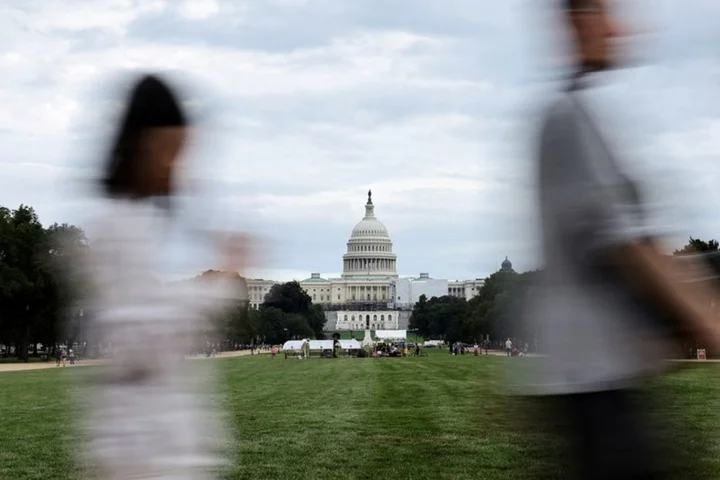By Saeed Azhar and Nupur Anand
NEW YORK Deposits at U.S. banking giants including JPMorgan and Wells Fargo are expected to extend their second-quarter decline as consumers keep spending and moving their money in search of higher yields.
"We do expect deposits to come down," Wells Fargo chief financial officer Mike Santomassimo told reporters on an earnings conference call on Friday.
The lender's average deposits fell 7% to $1.3 trillion at the end of June, "reflecting consumer deposit outflows on consumer spending, as well as customer migration to higher yielding alternatives," it reported in second-quarter results.
At JPMorgan, the nation's largest bank, average deposits fell 6% in the second quarter to $2.4 trillion from a year earlier.
The bank expects a modest decline in deposits across major businesses, chief financial officer Jeremy Barnum told analysts during the bank's second-quarter earnings call.
JPMorgan benefited from $68 billon of deposits from First Republic Bank, which it acquired in May in a government auction.
JPMorgan said that any revision in deposit rates would be driven by competition and consumer feedback.
"There is no circumstance that we've ever seen in the history of banking where rates didn't get to a certain point that you had to have competing products," JPMorgan CEO Jamie Dimon said.
"And we're going to have to compete for that."
On the call, JPMorgan also said the downtrend in deposits was a result of the Fed's quantitative tightening (QT), which is shrinking the central bank's balance sheet after it expanded with stimulus prompted by the pandemic.
There is pressure on deposits arising from the Fed's effort to reduce its balance sheet which forces banks to limit reserves and deposits in their system.
Citigroup's deposits were broadly steady at $1.3 trillion in the second quarter from a year earlier, as it benefited from an increase in institutional deposits, which offset a slide from its securities services business.
Deposits at U.S. banks have stabilized after a tumultuous period in March, when two of the largest bank failures since the 2008 financial crisis spurred consumers to seek safety by moving their money to large institutions.
Some depositors have also moved cash out of savings accounts into higher-yielding certificates of deposits.
In its effort to reduce demand and curb inflation, the Federal Reserve has raised interest rates aggressively since last year.
Preliminary data from the Fed show that while banks both large and small continued to shed deposits in the second quarter, they did so at a notably slower rate than in the first quarter.
The central bank reported total bank deposits fell 1.2% to $17.26 trillion through the week ended June 28 versus $17.47 trillion at the end of March.
For large banks, deposits fell 1.3% to $10.80 trillion from $10.95 trillion during same period, the Fed data showed. And for small banks, deposits fell 0.9% to $5.18 trillion from $5.23 trillion.
The declines were notably smaller than the first-quarter drops of 2.4% for large banks and 3.3% for small banks.
While higher rates are expected to boost earnings for larger banks, those gains will be tempered by moderating appetite for loans and higher deposit costs, Kenneth Leon, director of equity research at CFRA, said in a note.
(Reporting by Saeed Azhar, Dan Burns, Nupur Anand and Tatiana Bautzer; Editing by Lananh Nguyen and Mark Potter)









